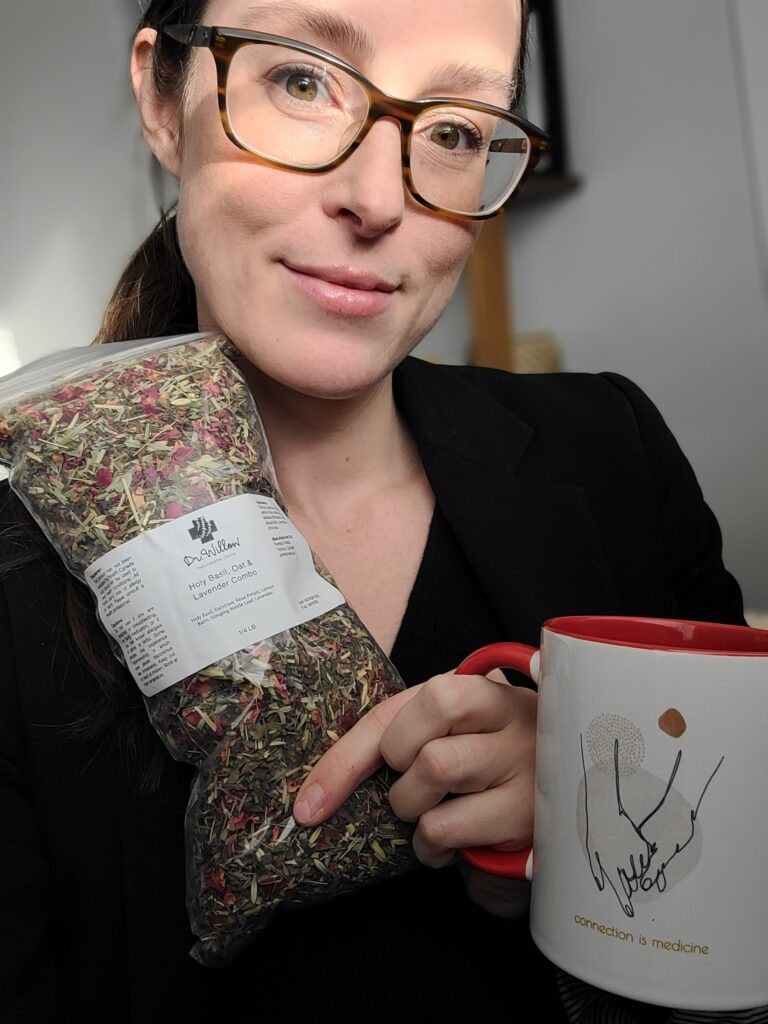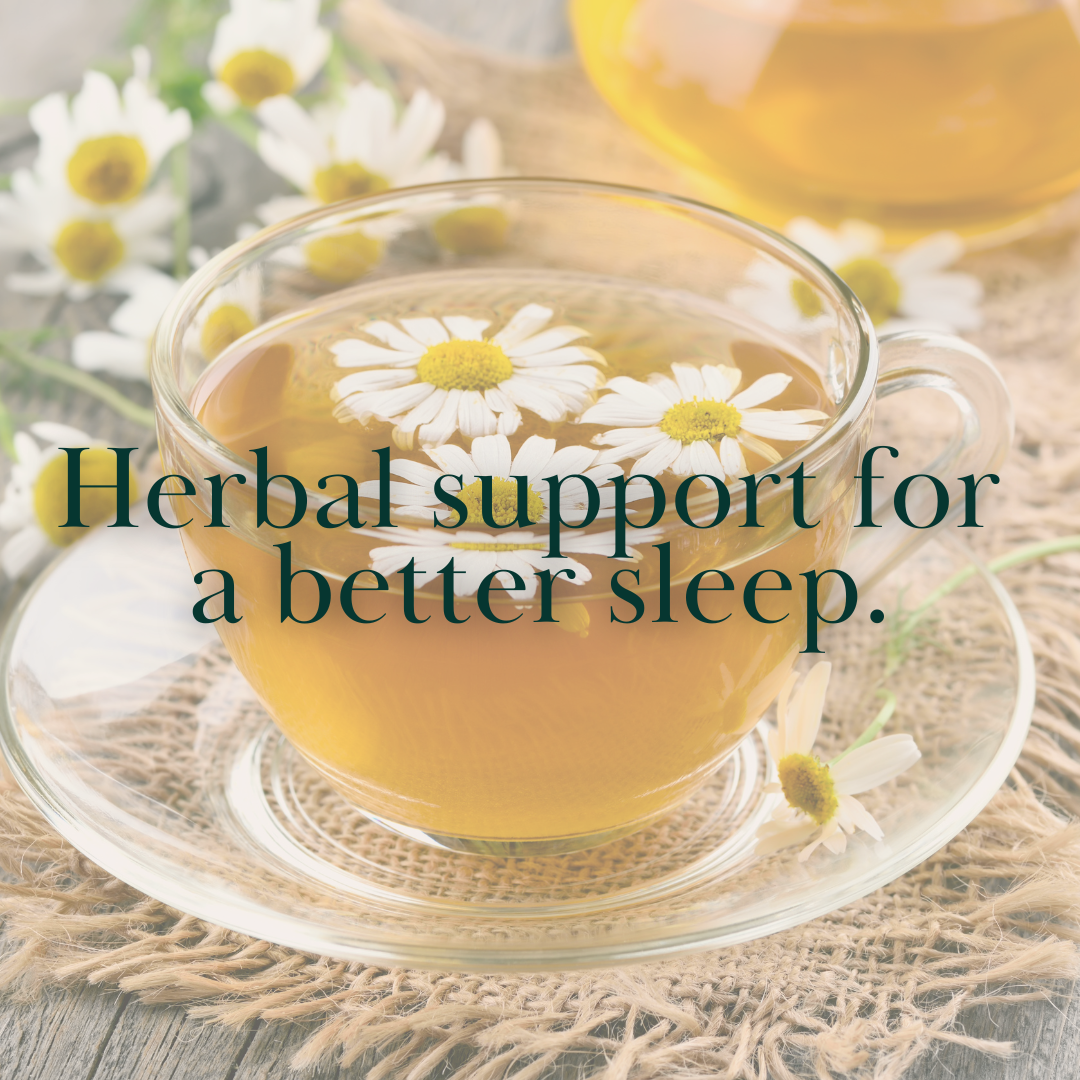HOME
MY STORY
SERVICES
ARTICLES
PRODUCTS
CONTACT
BOOK NOW
SERVICE OVERVIEW
ACUPUNCTURE
LABS
PRESCRIPTIONS
FAQs
We’re continuing on with the holiday sleep series! Today I’ll be covering a few more of my fave sleep supports, including:
- L-theanine
- Lemon balm and Chamomile
- Passionflower and Skullcap
L-theanine, oh how I love thee
I love L-theanine. It is beneficial for those who suffer from stress and anxiety, or those who find it difficult to focus, relax, or fall asleep.
L-theanine is a calming amino acid found almost exclusively in green tea. It doesn’t actually cause drowsiness but it is so calming and fast acting that it works great for sleep – whether before bed or upon waking in the night to help you fall back asleep when that mind is racing. Results are usually felt within 30 minutes.
L-theanine alters brain wave activity (enhances alpha brain waves which are dominant during a relaxed or meditative state), helping to calm racing thoughts and help you feel more “zen”. It also influences the levels of neurotransmitters dopamine, serotonin and GABA in the brain, balancing mood, sleep and even learning capacity. L-theanine reduces feeling of stress by inhibiting some of the actions of norepinephrine (a stress hormone) in the central nervous system.
I won’t get into it today but I use it a tonne with my patients with ADHD (it’s even been studied in kids as young as 8) to improve focus and concentration. Because it is non-sedating, it is also great for daytime use for anxiety. It can be so effective for stress & anxiety that I’ve had patients be able to use it instead of their benzodiazepine medications for panic attacks. Caveat: do not do that without the guidance of your prescribing physician.
Lemonbalm or Chamomile teas
Chamomile
More people are familiar with Chamomile than Lemonbalm it seems. I tend to choose lemonbalm first over chamomile but it depends on the case.
Chamomile is widely regarded – anecdotally – as a mild sedative and sleep-inducer (it is also great for many digestive complaints, menstrual cramps, baby colic, and topically for externally for skin conditions (e.g. eczema). Sedative effects may be due to the flavonoid, apigenin, that binds to benzodiazepine receptors in the brain.
Some will argue taking the apigenin extract from chamomile is needed since the apigenin content is not high enough in whole chamomile flowers but I sometimes think, why not give the diet or tea version of the treatment a go first? Some people just need a gentle nudge to relax and also, having a tea ritual can be a nice way to unwind and signal to your body that it is time to prepare for sleep.
To make chamomile tea, the flowers are dried and then infused into hot water.
See below for a recipe & medicinal tea tips!
Lemon balm
Lemonbalm is another lovely nervine herb (having a calming or nourishing effect on the nervous system). It helps reduce anxiety, stress, nervous tension, restlessness, and insomnia. Like Chamomile, it is also good for digestion – relieving gas and bloating – as well as having anti-viral properties.
Some of my patients have sworn by their cup of nightly lemon balm tea. Others have had to up the ante and use a tincture (i.e. concentrated liquid herbal extracts).
Note – herbs can be used as single ingredients or mixed in a blend. Valerian is another common herb used as a tea and passionflower as well, which I discuss below. Some people get the complete opposite reaction with valerian – stimulated not sedated – so just be mindful if trying that one.
Passionflower and Skullcap
Skullcap + Passionflower are my two favorite plants for calming the mind & body. They help stop the overthinking that happens *right* when your head hits the pillow, as well as relaxing any tension in the body. Very supportive for cyclical thinking where the mind feels like it just won’t turn off & SLEEP.
🫖 Sleepy Time Tea 🫖
Rather than give an outright recipe (there are so many options from single herb use to blends), I’m going to point out some tips when it comes to using teas as herbal medicines.
Brewing tips:
Steep covered for up to 20 minutes, at least 10
Use a tea cozy to keep the heat in during these longer steeps.
Pros of loose leaf teas:
Loose leaf tea can offer superior quality, effectiveness, and taste without the environmental exposure of microplastics. This is especially true for certain herbs – e.g. whole bud chamomile vs teabag chamomile
By microplastics, I am referring to the 11.6 billion microplastic and 3.1 billion nanoplastic particles a 2019 study (from McGill University in Montreal) found to exist in 1 cup of tea from a single PET or nylon tea bag.
Other tea tips:
Make it self care/part of a ritual to look forward to
If you must really limit your fluid intake near bedtime, herbal tinctures may be a better option for you.
Did you know that I order & blend custom loose leaf herbal teas for patients?

Want to learn more? Ask me about getting a custom tea blend at your next appointment.
Not a patient yet? Click here to add yourself to my waiting list.
Stay tuned for a few more of my sleep favourites including:
- GABA
- The myriad of ways we work on bringing down your cortisol, such as Ashwagandha or Phosphatidylserine,
- And last but definitely not least, TCM Acupuncture!
- Dr. Willow
Leave a Reply
WILLOW
meet
I help women achieve optimal digestive and hormonal wellness through a root cause, individualized approach to medicine that utilizes functional lab testing, diet and lifestyle modification, nutritional and herbal medicine, and acupuncture to re-establish lasting health.
LEARN MORE
women's ♀️ group health program coming soon, stay tuned 👀!
Gut health program coming soon, stay tuned 👀!
join
THE COMMUNITY
I WANT IN!
Between my wait listed practice and being Mom, I don't email often, but I'm working behind the scenes to bring you major value and I'd love to be able to tell you about it when it is ready (along with some more personal shares).

Be the first to comment